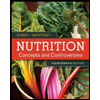The estimated energy need for a moderately active 16-year-old male is 2,800 kilocalories/day; for a moderately active 16-year-old female it is 2,000 kilocalories/day. It is recommended that intake of added sugars not exceed 6½% of total daily kilocalorie intake. What is the recommended maximum number of calories you should intake from added sugars?
The estimated energy need for a moderately active 16-year-old male is 2,800 kilocalories/day; for a moderately active 16-year-old female it is 2,000 kilocalories/day. It is recommended that intake of added sugars not exceed 6½% of total daily kilocalorie intake. What is the recommended maximum number of calories you should intake from added sugars?
Chapter7: Weight Management
Section: Chapter Questions
Problem 6SC
Related questions
Question

Transcribed Image Text:6. The estimated energy need for a moderately active 16-year-old male is 2,800 kilocalories/day;
for a moderately active 16-year-old female it is 2,000 kilocalories/day. It is recommended that
intake of added sugars not exceed 6½% of total daily kilocalorie intake.
What is the recommended maximum number of calories you should intake from added sugars?
7. If 12-ounce cans of soft drink contain 150 kilocalories from added sugars and are the only source
Expert Solution
Introduction
Food is made up of a wide range of nutrients including carbohydrates, fats, proteins, vitamins, minerals, and water. The types and quantities of food consumed on a daily basis are referred to as a person's diet.
Food is an energy source, and the energy emitted from it is known as food energy.
Nutrition is the process of getting or giving food that is essential for growth and health. Macronutrients and micronutrients are 2 different types of nutrition.
- The energy content of one gram of carbohydrate is 4 kcal.
- The energy content of one gram of protein is 4 kcal.
- The energy content of one gram of fat is 9 kcal.
Trending now
This is a popular solution!
Step by step
Solved in 2 steps

Recommended textbooks for you


Nutrition: Concepts and Controversies - Standalo…
Health & Nutrition
ISBN:
9781305627994
Author:
Frances Sizer, Ellie Whitney
Publisher:
Brooks Cole



Nutrition: Concepts and Controversies - Standalo…
Health & Nutrition
ISBN:
9781305627994
Author:
Frances Sizer, Ellie Whitney
Publisher:
Brooks Cole


